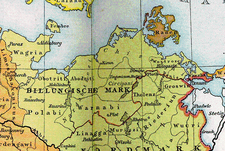
Warnabi
Encyclopedia

West Slavs
The West Slavs are Slavic peoples speaking West Slavic languages. They include Poles , Czechs, Slovaks, Lusatian Sorbs and the historical Polabians. The northern or Lechitic group includes, along with Polish, the extinct Polabian and Pomeranian languages...
tribe of the Abodrite confederation in the ninth through eleventh centuries. They were one of the minor tribes of the confederation living in the Billung Mark on the eastern frontier of the Holy Roman Empire
Holy Roman Empire
The Holy Roman Empire was a realm that existed from 962 to 1806 in Central Europe.It was ruled by the Holy Roman Emperor. Its character changed during the Middle Ages and the Early Modern period, when the power of the emperor gradually weakened in favour of the princes...
. They were first mentioned by Adam of Bremen
Adam of Bremen
Adam of Bremen was a German medieval chronicler. He lived and worked in the second half of the eleventh century. He is most famous for his chronicle Gesta Hammaburgensis Ecclesiae Pontificum .-Background:Little is known of his life other than hints from his own chronicles...
.
Etymologically their name is related to the river, the Warnow
Warnow
The Warnow is a river in the state of Mecklenburg-Vorpommern in Germany. It flows into the Baltic Sea near the town of Rostock, in its borough Warnemünde....
(also Warnof, Wrana, or Wranava), along which they settled in the region of Mecklenburg
Mecklenburg
Mecklenburg is a historical region in northern Germany comprising the western and larger part of the federal-state Mecklenburg-Vorpommern...
. It may have meant "crow river" or "black river" in their Slavic language, or been derived from the name of the Warni (from earlier warjan), a Germanic people who had previously lived in the same area. The name Warnabi may be a combination of Warni and Abodriti.
In the second half of the ninth century the chief city of the Warnabi was on an island in the Sternberger Lake at the site of the castle of Gross Raden. The centre of their culture was near the present towns Sternberg and Malchow
Malchow
Malchow is a municipality in the Mecklenburgische Seenplatte district, in Mecklenburg-Western Pomerania, Germany.-Geography:It is situated on the river Elde, 25,5 km west of Waren, and 35 km north of Wittstock.-History:...
. From 1171, 1185, and 1186 there are references to the land of the Warnabi: the Warnowe. In 1189 it is called the Warnonwe and by 1222 this was called the Wornawe.
Sources
- Howorth, H. H. "The Spread of the Slaves. Part III. The Northern Serbs or Sorabians and the Obodriti." The Journal of the Anthropological Institute of Great Britain and Ireland, Vol. 9. (1880), pp 181–232.
- WARNOWER at Lexikon des Mittelaters.

